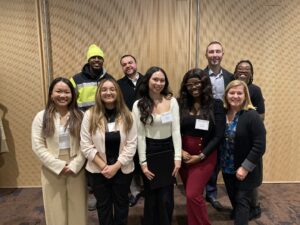Your Two Cents: Empowering Generations Through Money Coach

At a recent Your Two Cents event we had the pleasure of featuring a panel of Money Coach alumni who shared invaluable insights into the importance of investing in teens for a financially secure future. The students were also given the opportunity to ask questions of the business leaders in attendance during a flash mentoring segment. Throughout the engaging question and answer session, one prominent theme emerged: with access to financial education and mentoring, teens not only benefit personally, but they become empowered to serve as catalysts for change within their families, bridging the gap in financial capability that may have persisted for generations:
“It was important for me to sign up for Money Coach because in my community we don’t talk about finances. It’s kind of an off-limits topic. I am one of the oldest of my siblings so being able to maintain the education I learned and pass down the knowledge I received in the program means a lot to me.” – Dejah
“The Money Coach program is making a change, centuries down the line. This is something that we will be teaching our kids, and that our kids will teach their kids. It’s not just a one-time thing, it’s making a change for generations to come.” – Grady
“My parents were born in Mexico and migrated to the United States, so they never really taught me anything about financial literacy because they didn’t know the language. Everything I learned in Money Coach is why I’m double majoring. I want to be a source of information for people like me and for families like mine to seek advice from. When I took what I learned in Money Coach back home to my parents they didn’t even know what to say, which says a lot about how under-resourced they were. I just want to give my family a chance to build their wealth in America so they don’t have to constantly live in survival mode.” – Julissa
“My parents were teens when they had me. They knew some things about finances but not enough to teach me in detail. I chose to be in the Money Coach program so I could learn about credit and budgeting, and it provided me with an opportunity to teach my dad about what I learned and where to start because he didn’t even have a bank account.” – Lilyana
As the alumni continued answering questions they got into a deeper discussion around the ideas of privilege, mentorship, access, and opportunity. Looking around the room, Grady pointed out that the majority of the business leaders in attendance were Caucasian. “Financial literacy does not have to be a privilege,” she said. “Unfortunately, I don’t quite see people of color here, or people from my community being considered wealthy or financially literate. It shouldn’t be a privilege to be considered those things, which is why Money Coach should be a requirement in all high schools.”
One of the ways that the Money Coach program can expand to other schools is through volunteer mentors and those mentor relationships continue after the program. Catrell described his Money Coach, Marcos, who was in attendance, as one of his “better friends”. “It started with us just talking about saving and investing. Marcos helped me gain more knowledge about how to invest my money and our relationship just grew from there.”
He went on to explain that the Money Coach program is so important because of limited access to financial education. “Financial education is not available to many people,” Catrell explained. “It’s good to be exposed to the things we learn in the program because a lot of students don’t know what to do with their money so it’s a great opportunity for them to gain further knowledge so they can better themselves.”
With access to financial education and a trusted adult to guide them, the Money Coach alumni see a huge transformation. For Dejah that transformation is both instant and long-lasting. “Since we can earn scholarships in the program those who donate are changing a life instantly by supplying them with money to buy food and clothing, but it’s not just about the changes in the classroom,” she said. “Just us sitting here years after completing the program and talking to all of you about how we still use what we learned is an example of long-term change. It’s about working to make sure future generations are knowledgeable.”
Julissa echoed the same sentiment regarding long-term change. “I never expected I’d be sitting at this table talking to you three years ago. Milwaukee has so much potential, but there’s also great poverty so being given a student resource like Money Coach is so important.”
Lilyana and Grady ended the Q&A portion of the night with a message to Money Coach supporters. “Think of it as helping your own kid. Many of us are not taught financial literacy in school,” said Lilyana. “When you invest your time, money, and energy into the Money Coach program, you’re helping a kid grow when the odds are against them.”
“We are the results of your donation and your time,” added Grady. “Not only are you investing in us and our futures, but you’re also teaching us to invest in ourselves. When we invest in ourselves, when we know our value and what we’re worth, then we can actually demand that we get what we’re asking for.”
And that’s the power of Money Coach.
For more information about the Money Coach program visit our website.
